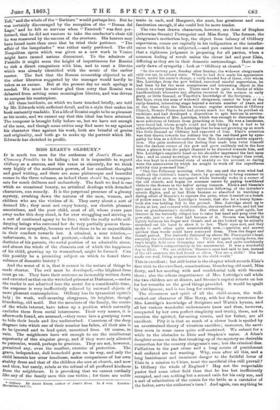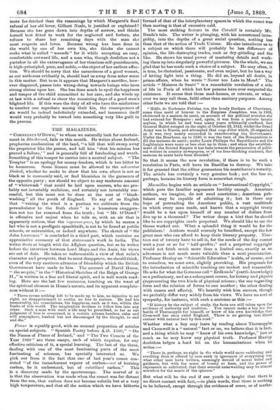MISS KEARY'S OLDBURY.* IT is much too soon for the
authoress of Janet's Home and Clemency Franklin to be failing ; but it is impossible to regard Oldbury as a success, and this vexes us sincerely, for we think very highly of the authoress's powers, of her excellent thoughts and good writing, and there are some picturesque and beautiful scenes in the three volumes, as indeed there should be, to compensate for much dullness and melancholy. The fault we find is one which no occasional beauty, no artistical dealings with detached characters, can remedy. It is the perpetual presence of a gloomy mystery, crushing down the natures of the men, women, and children who are the victims of it. They carry about a sort of doomed life ; they must not enjoy beauty, nor cherish pleasant associations, and the poor child, most of all, whose years pass away under this deep cloud, is for ever struggling and striving in a sort of continued agony to be free ; while the really noble selfdenying beings who surround her do very partially possess themselves of our sympathy, because we feel them to be so unjustifiable in their conduct towards her. A criminal, a near relation,— unfortunate, it is true, and penitent, —holds in his hand the destinies of his parents, the social position of an admirable sister, and almost the whole of the elements out of which the happiness of his child, growing up to womanhood, might be formed. Can this possibly be a promising subject on which to found three volumes of domestic history ?
And the worst of it is, that it cannot in the nature of things be made shorter. The evil must be developed,—the blighted lives must go on. They have their sentence as inexorably written down and executed as that on the wretched prisoner at Dartmoor,—and as the reader is not admitted into the secret for a considerable time, the suspense is very ineffectively relieved by outward objects of more pleasant contemplation. Oldbury has its tyrannical squire's lady ; its weak, well-meaning clergyman, its brighter, though blundering, old maid. But the members of the family, the centre .of the whole interest, have taken up a position which naturally excludes them from social intercourse. Their very names, it is afterwards found, are assumed,—they come into a gossiping town to hide their heads and live undisturbed. Conscious of the deep disgrace into which one of their number has fallen, all their aim is to be ignored and to lead quiet, unnoticed lives. Of course, in vain. The neighbours have wit enough to see the intellectual superiority of this singular group, and if they were only allowed to patronize, would, perhaps be gracious. They are not, however, ,permitted any, even the smallest, exercise of protection. The grave, independent, dull household goes on its way, and only the child laments her utter loneliness, makes comparisons of her own shabby dress and that of the children she sees at church, and now and then, but rarely, rebels at the refusal of all proffered kindness from the neighbours. It is provoking that we cannot cordially like any of the family save this one victim ; for there are noble traits in each, and Margaret, the aunt, has greatness and even fascination enough, if she could but be more tender.
The two best drawn characters, however, are those of Stephen (otherwise Steenie) Pierrepoint and Miss Berry. The former, the clergyman's motherless boy, the object from infancy of Oldbury supervision, comes out capitally in his indignation at the interferences to which he is subjected,—and you cannot but see at once that a righteous judgment is preparing for all parties, when a common feeling of revolt unites the clever lad and poor Elsie, differing as they are in their domestic surroundings. Here is the early dawn of sympathy : look at " Oldbury at church" :—
" In the rectory pew, Sunday after Sunday, the widower clergyman's only son sat, in solitary state. When he had first made his appearance there, under his nurse's charge, a curly-headed boy of three, over whom Mrs. Lutridge, from the pew behind, exercised careful supervision, he bad been by far the most conspicuous and interesting object in the church to every female eye. There used to be quite a flutter of white handkerchiefs whenever any allusion occurred in the sermon to early piety, or little Samuel, or Timothy's knowledge of the Scripture But boys, even the sons of widowed clergymen, cannot be kept at the curly-headed, interesting stage beyond a oertain number of years, and at the time when the Blakes became regular attendants at Oldbury Church, Steenie Pierrepoint had grown much too big to be perched on cushions, and had developed a disposition to spin buttons in servicetime, in defiance of Mrs. Lutridge, which was enough to discourage the most solicitous of fathers from preaching at him. He was a handsome, open-faced lad, whom people could not help liking ; but it had to be acknowledged even by Mrs. Lutridge that he was not growing up as much like little Samuel as Oldbury had expected of him. Elsio'a attention was first drawn towards the solitary boy in the red-lined pow by sympathy for him as a fellow-sufferer from Mrs. Lutridge's active supervision. She quite understood the feeling that made him twist himself into the darkest corner of the pow and grow suddenly red in the face when a glance from the pulpit chanced to be directed towards him, and Mrs. Lutridge's emphatic hand on his shoulder impressed the fact upon him ; and on sunny mornings, when the sermon was longer than usual, she was kept in a continual state of anxiety on his account, eo daring were the manceuvres by which he sought to work off the superfluous activity that possessed him." "One fine February morning, when the sun and the west wind had made all the children's hearts dance, by promising to bring summer to Oldbury all at once, an antiquated white butterfly woke in a corner of the old church, and began its summer career by paying bewildered visite to the flowers in the ladies' spring bonnets. Elsie's and Steeple's eyes met once or twice in their rapturous following of the intruder's erratic flights, and at last Elsie became so absorbed in watching a daring effort of Steenie's to capture the prize, when it rested on a bunch of yellow roses in Mrs. Lutridge's bonnet, that she let a heavy hymnbook she was holding fall to the ground. Mrs. Lutridgo stood up to frown at her, and covered with confusion, she crouched down, and hid her face on grandmamma'a shoulder. But when all was quiet again, her interest in the butterfly obliged her to raise her head and peep over the pew-side, just to see what bad become of it. Steenie was holding it lightly between his finger and thumb, and as she looked up he actually stretched out his hand to show it to her. Their eyes met, and they spoke to each other quite unmistakably now,—question and answer quicker than words could have convoyed them. Then the finger and thumb parted. The butterfly fluttered up above Mr. Pierrepoint's head, carrying the children's eyes with it. They met again coming down, the boy's bright, bold eyes brimming over with fun, and quite confidently claiming Elsie's companionship in his amusement. It was a wonderful day to Elsie. 'We are children,' Steenie's eyes had said to her, instead of the old sentence she had beard so often, You are a child.' She had made one real, living acquaintance in the child-world."
This is excellent ; but still better is the chapter which records Elsie's first visit to the excellent, conscientious, blundering old maid, Miss Berry, and her meeting with and confidential talk with Steenie there ; also the odious impertinence of Mrs. Lutridge's call while the two children are at dinner, and Steenie's capital retorts on her for her remarks on the good things provided. It would be spoilt by abridgment, and is too long for extracting. The cleverness and spirit of all the child-scenes, the wellworked-out character of Miss Berry, with her deep reverence for Mrs. Lutridge's knowledge of Scripture and Watts's hymns, and all her various wonderful endowments (now and then, however, conquered by her own perfect simplicity and truth), these, not to mention the spirited, far-seeing cousin, and her father, are all excellent. Pity it is that so much of a clever book is spoiled by an overstrained theory of vicarious sacrifice ; moreover, the sacrifices seem in some cases quite self-contrived. We submit for a while to the obstacles to Elsie and Stephen's union. A felon's daughter seems on the first breaking-up of the mystery no desirable connection for the country clergyman's son ; but the criminal dies. Palliatives to the past crime and a long course of punishment well endured are not wanting. Why, even after all this, and a long banishment and imminent danger to the faithful lover of Elsie in a mission to China, must the sacrificial idea still prevail? Is Oldbury the whole of England ? May not the respectable pastor find some other field than that he has but inefficiently occupied, and can nothing but a second exile for his only son, and a sort of substitution of the cousin for the bride as a caretaker of the father, serve the authoress's turn ? And again, can anything be
more far-fetched than the reasonings by which Margaret's final refusal of her old lover, Gilbert Neale, is justified or explained? Because she has gone down into depths of sorrow, and thinks herself best fitted to work for the neglected and forlorn, she refuses to share her remaining days with the man she most respects and loves. Because wrong has been done in the world by one of her own kin, she thinks she cannot make what is called " amends " for it while accepting an easy, comfortable outward life, and a man who, though doubtless not a partaker in all the extravagance of her vicarious self-punishments, is high-principled, pure, and noble,—the object of her earliest affection. We should be sorry that the earnestness of a good woman, as our authoress evidently is, should lead us away from sober sense in this matter. But to us it appears that Margaret's sacrifice, however disguised, passes into wrong-doing towards beings who have strong claims upon her. She has done much to spoil the happiness and temper of the child committed to her care, and she winds up at last with a refusal to cheer the remaining days of a good man's blighted life. If this were the duty of all who have the misfortune to number one reprobate among their kin, the consequences of sin would be indeed indefinitely extended, and innocence itself would very probably be turned into something very like guilt in the process.































 Previous page
Previous page